The public prosecutor has demanded that the 4 journalists of Iwacu newspaper and their driver be sentenced to fifteen years in prison over a WhatsApp joke. There are also other penalties. The office of the Director of public prosecutions only based upon a message from Agnès Ndirubusa to incriminate the entire team. A flashback on the hearing that took place on December 30, 2019 at the High Court of Bubanza.
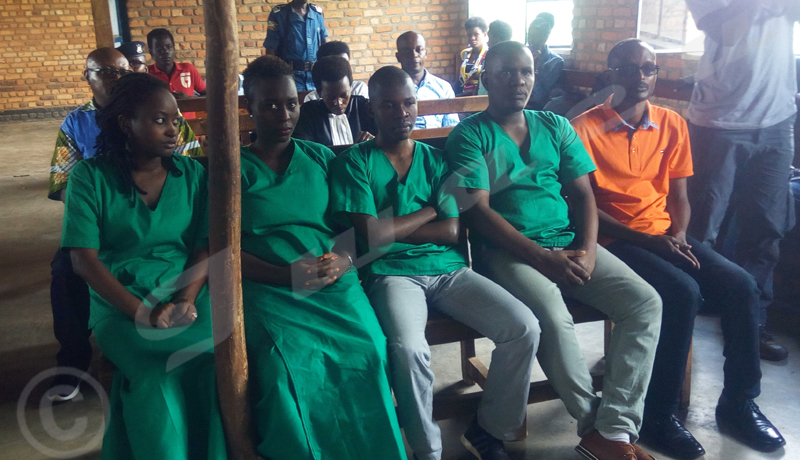
… In the dock
It is almost 9 o’clock when several people in green color surrounded by others in blue color go down the path separating the Bubanza High Court and the prison of Bubanza, a building erected on a small hill. Over some minutes, those people become known. They are prisoners escorted by the police. These guards don’t take their eyes off them. They go to appear before the court.
When these fellow journalists arrive before the Bubanza High Court, they are greeted by their relatives. The 4 journalists of Iwacu Press Group find themselves in the middle of their colleagues and other journalists. They give each other warm hugs.
It is a moment of joy, respite for these 4 reporters who have been imprisoned for more than two months. However, although they smile, there is a concern on their faces. Their driver, Adolphe Masabo, now released, tries to comfort them discreetly.
“We must keep our heads higher.” These are the words of all the journalists from different media organizations who came to cover this first appearance of these Iwacu journalists arrested in Musigati on October 22, 2019.
As a reminder, the police arrested them eight minutes after their arrival in this commune where clashes hag been reported between a group of rebels and the police. These reporters could not have time to collect information from the population apparently helpless following the heavy gunfire heard at dawn.
The police officers guarding these prisoners stay close to them. They will spoil this moment of grace. They lead them to a waiting room at Bubanza High Court.
“We come to claim our innocence”
Afterwards, these police officers will bring these journalists prosecuted for “complicity in undermining the internal security of the State” in the courtroom. Defendants accused of rape, robbery, etc. are also seated on benches. They all wear handcuffs.
The 4 journalists and their colleagues are thoughtful, they exchange little, they whisper a few words, Iwacu editor tries to read a newspaper, but curiously does not leave the front page. Obviously, he is also lost in thoughts.
One of the photojournalists says that eye contact with these colleagues sitting on the dock waiting for the start of the trial makes him feel uncomfortable.
This time will be a little longer. More than two hours before the arrival of the judges and the deputy of the prosecutor. When they finally enter the room, all in black gowns, all the people in the room stand up.
After reading the various cases on the agenda and verifying the presence of the various defendants, the 3 lawyers for the 4 Iwacu journalists and their driver put themselves on either side of their clients. It is 11:15 a.m. The hearing begins.
Supported by their lawyers, all 5 loudly proclaim their innocence. Even Christine and Egide who do not naturally raise their voices, advance their arguments to make themselves heard.
The sentences requested leave the public stunned
The indictment after a public hearing of about two hours will be terrible. The public will remain frightened, groggy. The case will be adjourned for further deliberation. The judges have at most 30 days to decide.
Apart from these 15 years of imprisonment for these 5 alleged journalists, the deputy prosecutor of Bubanza High Court, Jean Marie Vianney Ntamikevyo will also demand that these 4 journalists and their driver be temporarily prevented from voting.
He also suggests the seizure of their equipment: vehicle, camera, recorders, mobile phones, chargers, notebooks and national identity cards. Since their arrest, the car, parked outside, has been rotting in the rain.
During the hearing, the public prosecutor will insist on a WhatsApp message exchanged between Agnès Ndirubusa and a colleague.
Agnès jokingly wrote to a reporter that she was going to Musigati ”to support the rebels.”
“It is material evidence” proving the complicity of the 4 journalists of Iwacu and their driver with the rebels,” says the deputy prosecutor of Bubanza.
According to him, by going to Musigati, in the vicinity of the place where clashes took place, they use their quality of journalist to “collect and disseminate information subject to reinforce the rebel movement.”
“They are not prosecuted as journalists, but for the facts they are accused of,” continues Jean Marie Vianney Ntamikevyo. He refers to Articles 38 and 609 of the Criminal Code.
Stunned, all the colleagues of Agnès Ndirubusa, author of this joke, say before the bar that they don’t know about this WhatsApp conversation. “The editorial staff of Iwacu did not decide to send journalists to Musigati until around noon, after a message from the governor of Bubanza, published by Le Renouveau newspaper on Twitter, reassuring his population that the situation was under control.”
“No intention of harming”
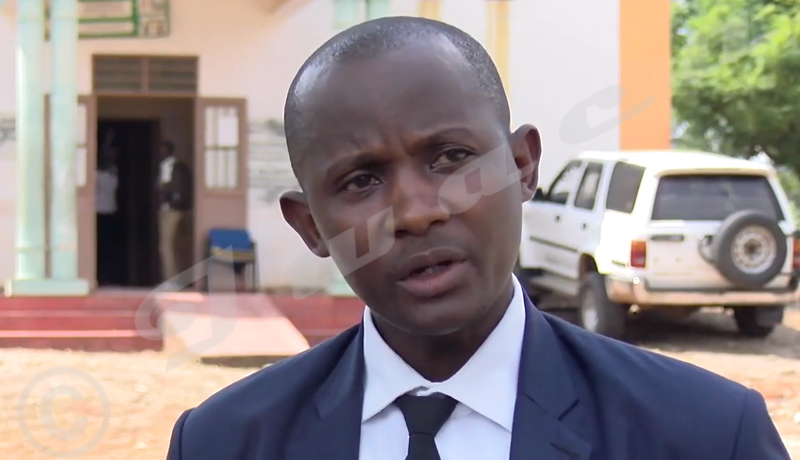
Clément Retirakiza: “There is reason to hope that the High Court of Bubanza will release them after the deliberation by the judges.”
Agnès Ndirubusa, a graduate in law and senior journalist, head of the political service at Iwacu will explain that this message with a colleague is to be placed in the register of black humor to joke.
“We have our own language. This message should not be dissociated from its context. It should not be taken word by word. If a mother tells her child that she is going to kill him, everyone knows that she will not do it,” Agnès defends herself.
And that’s not all, “the Public Prosecutor only insists on this message by omitting another one where I say that ” we are going to do battle with these people who want to disturb peace and elections ” (Tugiye gutuza abo bantu bashaka guhungabanya amahoro n ‘ ugutoba amatora)”.
As a reminder, after their arrest, the journalists were ordered to give their phones and access codes. Intelligence service agents fell on that message when they examined their telephones.
She will ask the Public Prosecutor – without receiving a convincing explanation – to produce evidence showing that she is in ”contact with these rebels ”. “After examining it, my phone could not show any message proving that I am in contact with these people.”
When lawyers speak, they refer to the Press Law, the Penal Code, the Constitution and the Universal Declaration of Human Rights ratified and incorporated into the Constitution of the Republic of Burundi.
It will be a question of proving that their clients are only prosecuted for facts which don’t constitute an offense. “They are journalists. They have the right to look for information everywhere on the national territory. Going to Musigati is not an offense,” they say.
In their arguments, the lawyers will say that the complicity advanced by the Public Prosecutor does not hold. “It cannot be imagined after the facts, more than 6 hours after the clashes since these journalists arrived in Musigati around 1 p.m. There was no intention to harm.”
“The Office of the Director of Public prosecutions cannot prove that going to Musigati to gather information means helping the rebels,” the lawyers say. In addition, no measure prohibiting access to the locality had been issued before.
According to Clément Retirakiza, one of these lawyers, there is reason to hope that the High Court of Bubanza will release them after the deliberation by the judges.
Story originally written by Abbas Mbazumutima and translated into
English by Pierre Emmanuel Ngendakumana

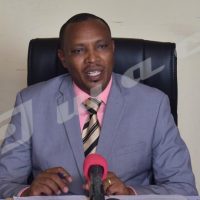

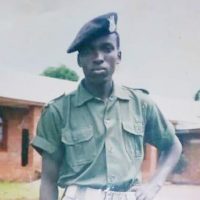
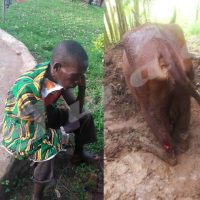














 IWACU Open Data
IWACU Open Data

